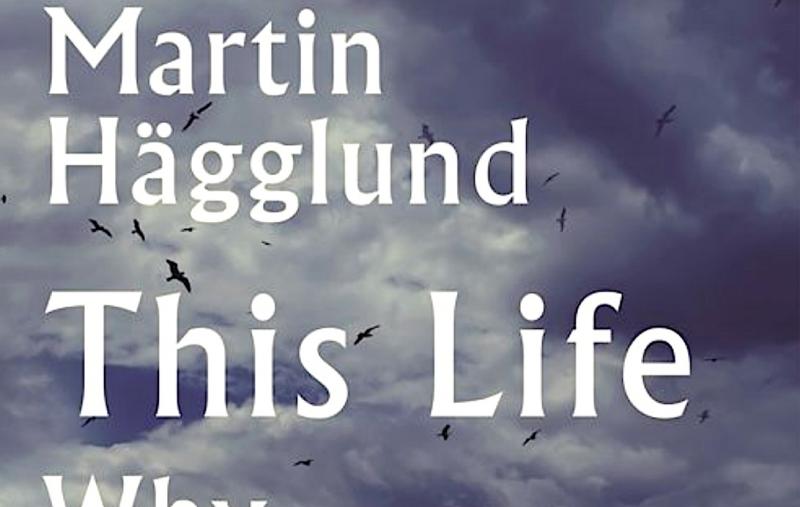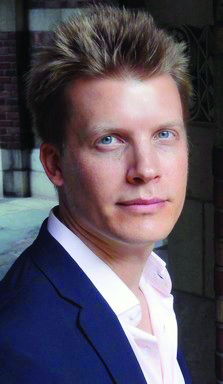Martin Hägglund: This Life - Why Mortality Makes Us Free review - profound book to be read slowly | reviews, news & interviews
Martin Hägglund: This Life - Why Mortality Makes Us Free review - profound book to be read slowly
Martin Hägglund: This Life - Why Mortality Makes Us Free review - profound book to be read slowly
Meditation on mortality emphasises collective and individual responsibility and agency

Swedish-born multi-lingual academic Martin Hägglund lives in New York and teaches philosophy and comparative literature at Yale. His new book, This Life, is a substantial examination of secular faith in contrast to religious faith.
He defines secular faith as devotion to life as it is lived, with all its uncertainties, joys and loss. His argument is the opposite of strident. Rather, it is a heartfelt and radical take on the notion of faith. Hägglund presupposes that to think of life as finite is itself a faith; death is the background against which life appears.
Hägglund accepts life as finite and proposes that our own lives are what we make of it. This point of view emphasises our individual responsibility and our freedom to exercise that responsibility. Life is for life’s sake. If we tend towards eternity, nothing we do matters except as an impossible progression towards an immutable state. We cannot depend on ideas of the eternal – of extrinsic rules from some divine otherworldly imposition – because that means the value of life and its loss is meaningless.
Hägglund makes his point in different ways. There is a frisson of shock as he quotes the words of comfort offered by Barack Obama, a publicly committed Christian, at the memorial service of Sandy Hook Elementary School in 2012, when he quoted Jesus “Let the little children come to me”. Hägglund suggests that the logical end of these sentiments suggests the killings were not ultimately a tragedy but “a transitional stage on the way toward God”. God, Obama was saying, called them home.
 He draws on many writers and philosophers, segueing from a meticulous examination of Karl Ove Knausgaard’s seven volume autobiographical My Struggle to Proust’s six volume In Search of Lost Time, while folding in the writing of economist Thomas Piketty, social commentator Naomi Klein and St Augustine. In a few hundred pages of philosophy, politics and economics he takes in Kierkegaard on the story for Abraham and Isaac, refers to Hitler and Mein Kampf, Adorno, Martin Luther, John Stuart Mill, and scores of the most significant writers, theorists, philosophers and economists of the past and present. It is an erudite reading list.
He draws on many writers and philosophers, segueing from a meticulous examination of Karl Ove Knausgaard’s seven volume autobiographical My Struggle to Proust’s six volume In Search of Lost Time, while folding in the writing of economist Thomas Piketty, social commentator Naomi Klein and St Augustine. In a few hundred pages of philosophy, politics and economics he takes in Kierkegaard on the story for Abraham and Isaac, refers to Hitler and Mein Kampf, Adorno, Martin Luther, John Stuart Mill, and scores of the most significant writers, theorists, philosophers and economists of the past and present. It is an erudite reading list.
Heroes feature. The core of the book is a reading of Karl Marx which differs from conventional interpretations, cogently noting that the authoritarian state was the least desirable panacea for society. Extrapolating from Marx, Hägglund argues not for what he calls a social democracy but for democratic socialism. He outlines this in some detail, alongside a quietly devastating take down of capitalism as well as the notion that reforming capitalism is possible.
The other radical hero is Martin Luther King, whose political speeches were absolutely about life as it was to be lived, and what actions were to be taken to reach those goals. He forbade the reporting and recording of speeches where he actually used the word socialism and his activism is carefully examined – as is the basis of potential reform being economic.
If King and Marx are in different ways his ideal political philosophers, the philosopher he admires most is Hegel, whose ideas thread through the book.
Partly, his argument captures the ways in which our attitudes transform how we live. Hägglund is concerned with religious faith and the ways in which it may blind us towards what we should do with the finite life we have, but also with what he calls political theology. He concludes that the only way forward is acknowledging that we own the responsibility of our life together and that ultimately it is destructive to “assume that we must defer to higher authority than we the people in order to hold together as a community”. It is not the New Jerusalem we must look to – but New York, or New Memphis: “if we help one another to own our only life.”
He offers “a secular vision of why everything depends of what we do with our time together”. The decline of religious faith is not to be lamented. Rather, it provides an opportunity to make explicit and strengthen our secular faith in this life as an end in itself.” The italics are the author’s, and indeed his use of italics throughout, is a curious and touching echo of the way students underline important points in lecture notes for emphasis.
Hägglund’s This Life is a highly readable, accessible – yet profound – examination of what kind of society might enable life at its most fulfilling. Whilst realising our interdependence, we have to be responsible for our own fragile lives. The theses may be heavy, but the discussions and analyses, however complex, are written with a light touch and beguiling clarity which is both wholly absorbing and deeply relevant. The reader is complicit, a partner. It is a book to read slowly, and this reviewer is about to start reading it all over again.
- Martin Hägglund, This Life: Why Mortality Makes Us Free (hardback, £20)
- Read more book reviews on theartsdesk
Add comment
The future of Arts Journalism
You can stop theartsdesk.com closing!
We urgently need financing to survive. Our fundraising drive has thus far raised £49,000 but we need to reach £100,000 or we will be forced to close. Please contribute here: https://gofund.me/c3f6033d
And if you can forward this information to anyone who might assist, we’d be grateful.

Subscribe to theartsdesk.com
Thank you for continuing to read our work on theartsdesk.com. For unlimited access to every article in its entirety, including our archive of more than 15,000 pieces, we're asking for £5 per month or £40 per year. We feel it's a very good deal, and hope you do too.
To take a subscription now simply click here.
And if you're looking for that extra gift for a friend or family member, why not treat them to a theartsdesk.com gift subscription?
more Books
 'We are bowled over!' Thank you for your messages of love and support
Much-appreciated words of commendation from readers and the cultural community
'We are bowled over!' Thank you for your messages of love and support
Much-appreciated words of commendation from readers and the cultural community
 Justin Lewis: Into the Groove review - fun and fact-filled trip through Eighties pop
Month by month journey through a decade gives insights into ordinary people’s lives
Justin Lewis: Into the Groove review - fun and fact-filled trip through Eighties pop
Month by month journey through a decade gives insights into ordinary people’s lives
 Joanna Pocock: Greyhound review - on the road again
A writer retraces her steps to furrow a deeper path through modern America
Joanna Pocock: Greyhound review - on the road again
A writer retraces her steps to furrow a deeper path through modern America
 Mark Hussey: Mrs Dalloway - Biography of a Novel review - echoes across crises
On the centenary of the work's publication an insightful book shows its prescience
Mark Hussey: Mrs Dalloway - Biography of a Novel review - echoes across crises
On the centenary of the work's publication an insightful book shows its prescience
 Frances Wilson: Electric Spark - The Enigma of Muriel Spark review - the matter of fact
Frances Wilson employs her full artistic power to keep pace with Spark’s fantastic and fugitive life
Frances Wilson: Electric Spark - The Enigma of Muriel Spark review - the matter of fact
Frances Wilson employs her full artistic power to keep pace with Spark’s fantastic and fugitive life
 Elizabeth Alker: Everything We Do is Music review - Prokofiev goes pop
A compelling journey into a surprising musical kinship
Elizabeth Alker: Everything We Do is Music review - Prokofiev goes pop
A compelling journey into a surprising musical kinship
 Natalia Ginzburg: The City and the House review - a dying art
Dick Davis renders this analogue love-letter in polyphonic English
Natalia Ginzburg: The City and the House review - a dying art
Dick Davis renders this analogue love-letter in polyphonic English
 Tom Raworth: Cancer review - truthfulness
A 'lost' book reconfirms Raworth’s legacy as one of the great lyric poets
Tom Raworth: Cancer review - truthfulness
A 'lost' book reconfirms Raworth’s legacy as one of the great lyric poets
 Ian Leslie: John and Paul - A Love Story in Songs review - help!
Ian Leslie loses himself in amateur psychology, and fatally misreads The Beatles
Ian Leslie: John and Paul - A Love Story in Songs review - help!
Ian Leslie loses himself in amateur psychology, and fatally misreads The Beatles
 Samuel Arbesman: The Magic of Code review - the spark ages
A wide-eyed take on our digital world can’t quite dispel the dangers
Samuel Arbesman: The Magic of Code review - the spark ages
A wide-eyed take on our digital world can’t quite dispel the dangers
 Zsuzsanna Gahse: Mountainish review - seeking refuge
Notes on danger and dialogue in the shadow of the Swiss Alps
Zsuzsanna Gahse: Mountainish review - seeking refuge
Notes on danger and dialogue in the shadow of the Swiss Alps
 Patrick McGilligan: Woody Allen - A Travesty of a Mockery of a Sham review - New York stories
Fair-minded Woody Allen biography covers all bases
Patrick McGilligan: Woody Allen - A Travesty of a Mockery of a Sham review - New York stories
Fair-minded Woody Allen biography covers all bases

Comments
"This life..." is a book that